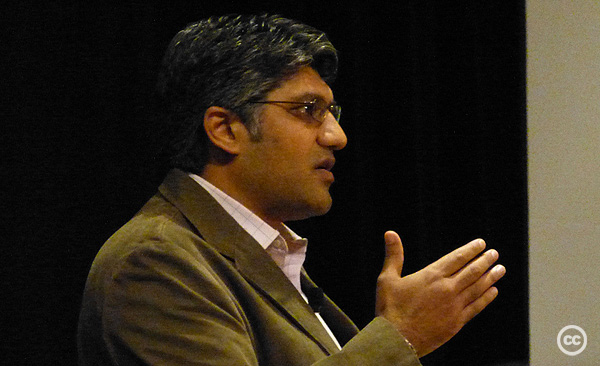
There are no technological barriers to staving off a climate crisis. So what's really holding us back?
I've recently returned home after two weeks of intensive meetings, workshops and speaking engagements in the U.S., where this question was at the heart of virtually every conversation.
The most obvious answer, of course, is that the vested interests of the fossil fuel dinosaurs and their powerful lobbyists serve to maintain the status quo. But if we let that stop us, we might as well pack up and go home now. The fossils always have been and always will be immovable objects -- no one has ever really been fooled by greenwash marketing campaigns such as BP's "Beyond Petroleum" or Shell's brief foray into renewables.
A more interesting take on this question was delivered by Jigar Shah -- a dyed-in-the-wool capitalist, albeit one who made a career in clean energy -- at the SXSW Eco conference in Austin. By his estimation, what's missing from the climate debate is a powerful (enough) combination of inspiration and outrage.
He opened his keynote speech describing his excitement watching the final voyage of the Discovery space shuttle from the roof of his office in Washington D.C. He was reminded of the president whose vision more than 50 years earlier had made that moment possible.
When it comes to the clean energy revolution, according to Shah, we're still waiting for that visionary president to inspire us, to suspend our disbelief, to tell us simply, "it's possible." He asked the audience, "20 years from now, what will you be willing to stand on the roof to watch go by? Until a politician can help you answer this question, we won't get to a clean energy future."
 Jigar Shah speaking at SXSW Eco, 27 October 2012. Photo: Kelly Rigg.
Jigar Shah speaking at SXSW Eco, 27 October 2012. Photo: Kelly Rigg.
Great stuff, but it was when he moved on to the second part of the equation, the question of moral outrage, that he really grabbed my attention. After all, I had just come from New York where I participated in the launch of the 2012 Climate Vulnerability Monitor whose authors estimate that around 400,000 people are dying every year due to hunger and communicable diseases aggravated by climate change and that another 4.5 million or so die from air pollution.
These are shocking figures by any standard, but were we, the public, truly shocked? The problem with the climate movement, according to Shah, is our failure to effectively communicate and mobilize around a powerful sense of moral outrage:
People aren't getting mercury in their bloodstream because we're dumping thermometers in the river. It's coming from toxic fuels like coal. We allow companies to dump their externalities into our health care system, which we pay real money for. And apparently we don't care enough about our neighbors to keep them healthy.
And further:
Doing good things in in our communities is great, but it doesn't give me hope we can defeat the 6° agenda. We are never going to win this battle with technology alone. If we can't make the case that in essence we are trading off human lives for the economy, we're going to lose, and lose badly. We have lost our outrage.
His comments brought to mind the debate about whether it's enough to reduce fossil fuel consumption even if we don't do it for the "right" (climate) reasons. The argument goes that the climate doesn't care why you reduce your emissions, only that you do it. And this is true to a degree -- if you buy a small car to save on fuel prices, you won't trade it in if gas prices go down again.
But just like the difference between climate and weather, the trends are of greater concern than individual behavior. How can it be that investment in clean energy is heading for a disappointing drop in 2012 while the International Energy Agency warns that without a radical change in direction, in just a few short years we will have closed the door to limiting global temperature rise to 2°?
Please pause for a second, and read that last sentence again.
Shah's reference to externalities and the trade-off of human lives for short-term economic gain is key, and this ultimately comes down to a failure of political will. The failure of politicians to level the playing field for fossil fuel and renewables subsidies -- renewables receive on the order of 8 cents for every one dollar received by fossils. Their failure to adopt caps on carbon emissions and effectively address climate change. Their failure to make it illegal to kill people with toxic, dirty fuels such as coal.
Did you ever see the movie It's a Mad, Mad, Mad, Mad, World made in 1963? Well 50 years on, we'd need to add at least three or four more "Mads" to the title to even begin to describe the insane politics of climate and energy policy.
Shah thinks it's the job of the movement to deliver the moral outrage, leaving the financial and business cases to be made by experts in those fields, like renowned economist Nicholas Stern who just called out Britain's anti-market approach to innovation in the energy market.
I would agree that whether it's taking a single action with the power and dignity of a Rosa Parks (or Eleanor Fairchild) or participating in mass actions of non-violent civil disobedience, each and every one of us has a moral imperative to speak out, and ultimately to hold our elected officials' feet to the fire. If we don't do it, who will?
This post was written as a contribution to Blog Action Day 2012, 'The Power of We.' To see how your country scores on climate impacts (as measured in projected annual GDP loss) you can check out a visualization of DARA's data from the Climate Vulnerability Monitor on the TckTckTck website -- http://tcktcktck.org/impacts.
